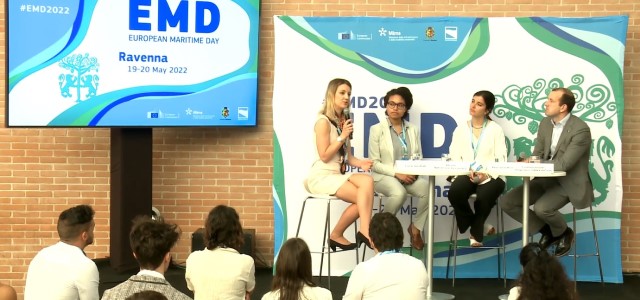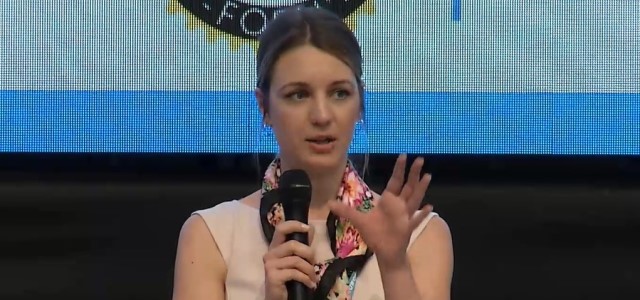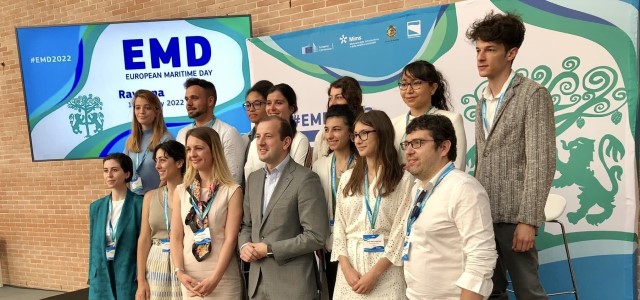2022 has been dedicated as the year of youth, giving more space for youth engagement. One of such opportunities was created at the European Maritime Day(EMD), an annual flagship event organised by the Directorate General for Maritime Affairs and Fisheries (DG MARE) of the European Commission.This year it was held in Ravenna, Italy with the focus on “Sustainable blue economy for green recovery”. It also hosted the EU4Ocean Summit, which focused on Ocean and Climate, Food from the Ocean and Healthy and Clean Oceans.
An aspiring young water and climate specialist, Luca Jendrek from Hungary, was invited to participate and present her project on transboundary cooperation and marine conservation. As a former GWP intern and current Erasmus+ YWC Programme participant, Luca Jendrek shared with us her thoughts and personal outcomes from the venue to inspire others like her and create connections to find solutions.
How did your Water and Climate Journey first start?
I was living on the Spanish coasts when I was first exposed to the massive plastic pollution of the coasts and the ocean. I thus started to volunteer for a local NGO working for the preservation of marine life in Mallorca. Later, I moved back to Hungary and joined the Youth for Water&Climate Program. Through this programme, I started to analyse the linkages between fresh and marine water resources, with the special focus on the Danube – Black Sea continuum, when a project idea came to my mind. I worked out my concept in detail, sent it along with my application to the Youth4Ocean Forum and a month later, I received the confirmation email with a big smile on my face saying I had been selected.
Rivers are great contributors to marine pollution, and we need to engage riparian landlocked countries as well, to follow a holistic approach if we want to preserve our oceans. That’s why as an ocean advocate I would like to raise awareness on the intertwined connections between rivers and oceans where young people can play an active role, if they are provided with the necessary knowledge and opportunity.
What is your project idea?
Danube plays a significant role in the plastic pollution of the Black Sea. One cubic meter of Danube water contains more than 300 plastic particles, and 85% of marine litter is plastic. But still, silo approaches are dominating at certain levels and people need more information and awareness on these issues.
Transboundary cooperation and marine conservation go hand in hand, and these two topics have never been more important than now. For this reason, I would liketo bring together like-minded, young people from Danube riparian countries, provide them with a learning platform thatequipsthem with the necessary knowledge and skills that they could test in a hackathon event and come up with innovative, unprecedented solutions. Networking and exchange are also very important, that’s why on-site, exchange visits would be organized to different riparian countries, enhancing connections over the borders.

Tell us more about your participation at the European Maritime Day and Ocean Literacy Summit.
This year, the EMD also hosted the EU4Ocean Summit which was focused on Ocean and Climate, Food from the Ocean and Healthy and Clean Oceans. In the framework of the EU4Ocean Summit, I got the chance to participatein a thematic panel discussion on “Walking on the sea traces: bringing a Healthy and Clean Ocean to inland” as young ocean advocate. It gathered speakers from the three components of the EU4Ocean Coalition - the EU4Ocean Platform, the Youth4Ocean Forum and the Network of European Blue Schools – as well as a representative from the European Commission and discussed ocean literacy initiatives, identified bottlenecks and future needs to be addressed.
How did you feel on the stage during the panel discussion?
Surprisingly calm! Though it was my first public speaking experience in front of a large audience, I was very lucky to be surrounded with such incredible panellists and audience who created a nice and relaxed atmosphere. I was able to deliver my speech just like I planned. I got the chance to share my thoughts on river and ocean health, talk about my project idea, represent young voices while being on the same stage with these honorary experts and professionals listening their commitments and works.
But your involvement in the conference didn’t stop here, because you also got the chance to talk to VirginijusSinkevičius, EU Commissioner for Environment, Oceans and Fisheries.
Yes, it was a very memorable and extraordinary moment. I was honoured to have a very engaging discussion with him. He shared with us how the history of his country, Lithuania, inspired and motivated him to start working in this field. He encouraged us and other young generations to continue our paths and drew up his future work and commitments toward ocean health. Together with two other young advocates, we shared our motivations, goals, plans while also sharing what we believe the of the Youth4Ocean Forum has been so far and what itshould be aiming for in the upcoming years.
I think I can say, on behalf of all the young advocates present for this discussion, that we were a little intimidated at first. We can all agree that talking with an EU Commissioner is a unique experience that doesn’t happen every day. That said, thanks to his friendly, kind and easy-going attitude, everything went smoothly, and it turned out to be a very enlightening conversation. His motivational and appreciative words, certainly inspired all of us to keep going on our ways and act jointly for the sake of our oceans.

You have recently joined the Youth for Water and Climate (YWC) Programme. How did it prepare you for this occasion?
The YWC Programme further highlighted the interconnectedness of water resources and need for transboundary cooperation. As I got acquainted with different water and climate aspects by learning from the modules, I started to analyse the linkages between fresh and marine water resources with the help of my mentor, Dr.MáriaCsete – who I have been paired up with. Moreover, communication, presentation skills and best practices on how to transfer a message to the audience are fundamental at a conference. There is still a lot to improve but the first blended mobility workshop in Budapest provided me useful tips & tricks how to do so.
What areyour take-aways from this conference?
Ocean literacy is still in its initial phase, but water challenges are not. We need more advocacy, awareness rising and knowledge-transfer in all countries, with a special focus on landlocked nations who might not be aware of how our everyday activities affect marine health, regardless of where we live.
Year of Youth is a nice initiative, but the upcoming years should also be dedicated to young generations. The Youth4Ocean Forum has recognized its importance and has been aiming to reach out to broader youth communitiesto let their voices be heard and give youth opportunities to actively engage in formal and informal events.
A great variety of topics were gaining attention during the event, and but some important topics such as the important role of women in the blue economy were presented barely discussed. Some highly important topics still need to be brought to the table, like the roles of rivers regarding marine health.
To conclude, let me quote Commissioner Sinkevičius, highlighting our fundamental connections with oceans:
“If we lose our oceans, it doesn’t matter if we are turning to renewables, driving electric cars or giving up eating meat. Without oceans, all of these efforts will be for nothing”
Interested in becoming a Young Ocean Advocate? Visit: https://webgate.ec.europa.eu/maritimeforum/en/frontpage/1484
Eager to develop your water&climate knowledge and skills? Head to: https://youthwaterclimate.org/
What is YWC Programme?
The Youth for Water and Climate Programme, an 8-month capacity-building program for young professionals in the water and climate sector, aims to support young professionals in acquiring transversal and specific skills which are essential in the water and climate sector. This programme also aims to empower young professionals to become advocates for a more sustainable world.
Launched in January 2022, twenty young water and climate professionals from Hungary, Slovakia, Belgium, France and Sweden form the first cohort of the Youth for Water and Climate Programme. This program is led by a consortium of several organisations: ISW-SWE, GWP, GWP-Hungary, GWP-CEE, cewas and Good Planet Belgium.
